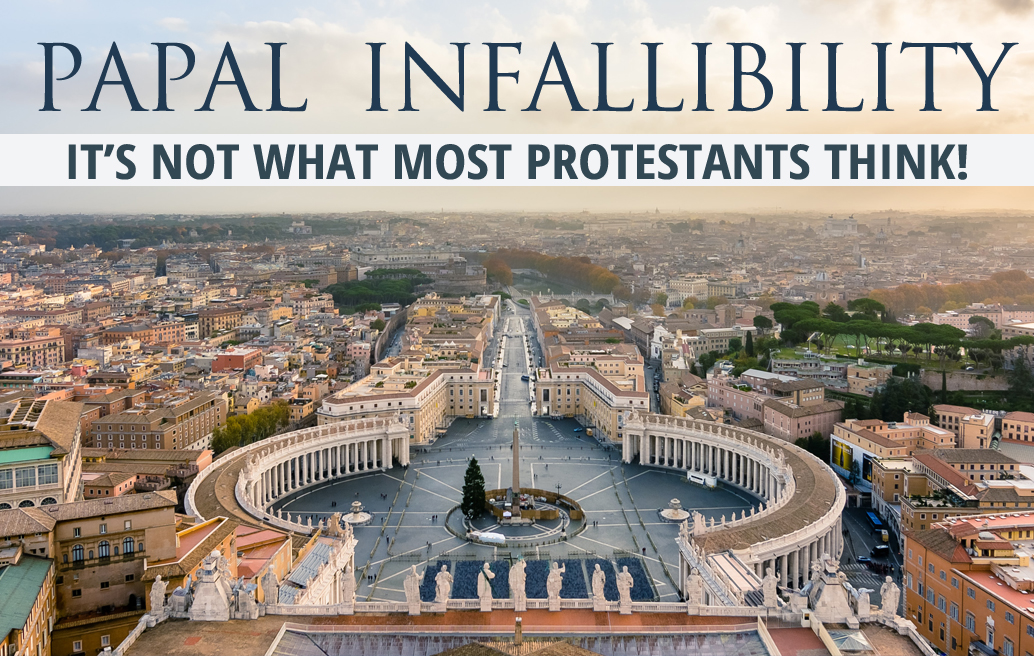Papal Infallibility: It’s not what most Protestants think!

Many Protestants assume that because the Roman Catholic Church teaches the pope is infallible, they also believe him to be sinless or “impeccable.” The all-too-common way of trying to show our Catholic brothers and sisters that this doctrine is wrong has been to point out the errors and even downright wicked behavior of many past popes. But Protestants who take this approach find their words falling on deaf ears and they wonder why Catholics appear to never acknowledge how truly evil some of their popes have been.
The reason is simple. While Protestants equate “infallible” with “sinless,” Catholics do not. Of course a Roman Catholic isn’t going to waste time trying to refute an argument against something they don’t believe in anyway!
 Infallible ≠ Sinless
Infallible ≠ Sinless
According to Vatican II, Catholics believe that infallibility is a charism—a miraculously given power—which the pope “enjoys in virtue of his office, when, as the supreme shepherd and teacher of all the faithful, who confirms his brethren in their faith (Luke 22:32), he proclaims by a definitive act some doctrine of faith or morals. Therefore his definitions, of themselves, and not from the consent of the Church, are justly held irreformable, for they are pronounced with the assistance of the Holy Spirit, an assistance promised to him in blessed Peter.” In other words, infallibility is a spiritual gift given to ensure his official pronouncements are without error.
No wonder Catholics scoff at Protestants who try to convince them past popes have been great sinners! Romans 3:23 states, “For all have sinned and fall short of the glory of [Yah].” Catholics know this applies to popes, too, so arguing about how wicked some past pope has been only argues for what they already believe.
Furthermore, the doctrine of infallibility extends to the bishops acting together. Again quoting from Vatican II:
Although the individual bishops do not enjoy the prerogative of infallibility, they can nevertheless proclaim Christ’s doctrine infallibly. This is so, even when they are dispersed around the world, provided that while maintaining the bond of unity among themselves and with Peter’s successor, and while teaching authentically on a matter of faith or morals, they concur in a single viewpoint as the one which must be held conclusively. This authority is even more clearly verified when, gathered together in an ecumenical council, they are teachers and judges of faith and morals for the universal Church. Their definitions must then be adhered to with the submission of faith” (Lumen Gentium 25).
Does this mean that infallibility is a gift Yahuwah has given the church to ensure sound doctrine?
The hidden dangers of infallibility

Catholics view infallibility as a divine gift to safeguard the pope (and bishops) from teaching error more than to ensure sound doctrine.
However, there are several problems with the doctrine of infallibility as defined by Catholics. The first is that the “church” being spoken of by the New Testament writers was not some official organization defining doctrines for a worldwide membership of all who would be Christians. The word translated into our modern Bibles as “church” actually comes from the Greek word, ekklesia. “This word stresses a group of people called out for a special purpose” (Strong’s #1577). In other words, a remnant. This is not how Catholics use the word “church.”
Another problem inherent to the infallibility doctrine is the circular reasoning used to support it. It is argued that since Yahushua stated that the gates of hell should not prevail against his “church,” the Church would never cease to exist. If the Church ever should teach error, it is argued, it would cease to be Yahushua’s Church. Therefore, according to Catholic understanding, it is impossible for it to ever teach error. This is an excellent example of circular reasoning: The Church would cease to exist if it ever taught error. Since the Church cannot cease to exist, it cannot teach error. Therefore it’s the true Church. This reasoning, of course, overlooks the original definition of ekklesia being a group of called-out ones.

The biggest danger with the doctrine of papal infallibility, however, is that it teaches sincere-minded people to look to an outside authority to learn truth. In their article entitled “Papal Infallibility,” Catholic.com states: “For men to be saved, they must know what is to be believed. They must have a perfectly steady rock to build upon and to trust as the source of solemn Christian teaching. And that’s why papal infallibility exists.”
By contrast, Yahushua promised to send the Comforter, saying, “I have much more to say to you, more than you can now bear. But when he, the Spirit of truth, comes, he will guide you into all the truth. He will not speak on his own; he will speak only what he hears, and he will tell you what is yet to come” (John 16:12-13). This promise is for believers of all time. We’re not to submit our wills or our minds to outside authorities. We’re to study for ourselves and be convicted for ourselves by the Holy Spirit given to each believer.
Yahushua on Infallibility
The Savior shared a principle that clarifies whether a person can commit the heinous crimes popes are known to have committed and still be trusted to teach deep spiritual truths without error. He said:
Beware of false prophets, who come to you in sheep’s clothing, but inwardly they are ravenous wolves. You will know them by their fruits. Do men gather grapes from thornbushes or figs from thistles? Even so, every good tree bears good fruit, but a bad tree bears bad fruit. A good tree cannot bear bad fruit, nor can a bad tree bear good fruit. Every tree that does not bear good fruit is cut down and thrown into the fire. Therefore by their fruits you will know them. (Matthew 7:15-20)
The doctrine of infallibility, while not what many Protestants have assumed, is still a problematic teaching. It teaches believers to look to fellow fallen humans for the spiritual light that Yahuwah is willing to give to each one directly. Furthermore, it underscores the erroneous belief that “the Church”—any church—can be trusted to have all truth.
You don’t need sinful humans to tell you the truth. Go to Yahuwah for yourself and He will teach you what you need to know.







